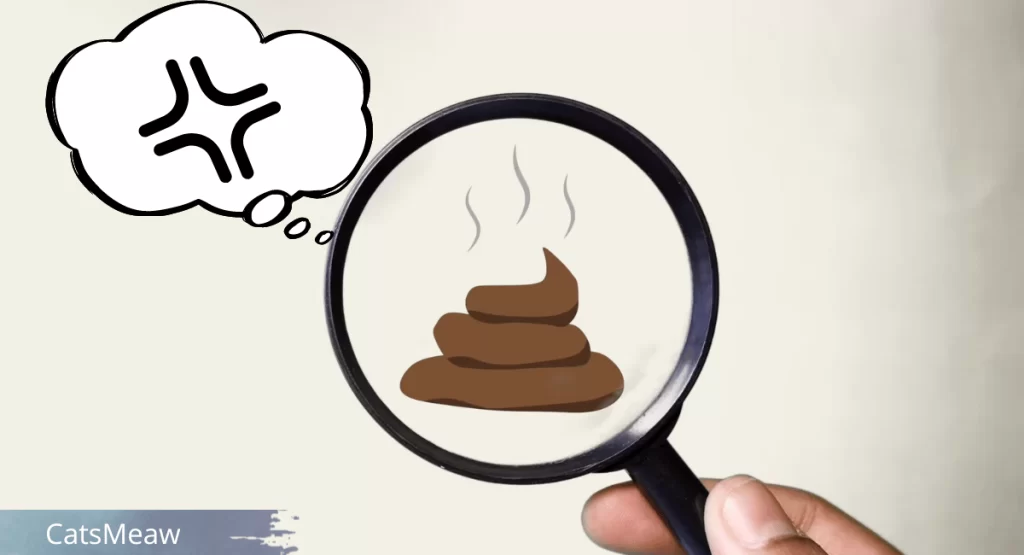if you are a cat owner, then it’s common to keep an eye on your furry friend’s behavior, health, and even their waste. Spotting blood in your cat’s stool can raise alarm bells instantly. This symptom, although distressing, is not uncommon in cats and can indicate a variety of underlying health conditions. Before jumping to conclusions, it’s crucial to understand that blood in stool in cats is a symptom, not a cat disease in itself, and warrants further investigation to identify its cause.

Table of Contents
Decoding the Appearance of Blood in Stool
Blood in stool in cats can take two primary forms, each indicating a different origin within your cat’s body.
Fresh, Bright Red Blood
Hematochezia is the term used to describe the presence of fresh, bright red blood in a cat’s stool. This type of blood is usually indicative of a problem in the lower parts of the digestive tract, such as the colon or the rectum. It typically shows up as red streaks on the outside of the feces or as drips of blood from the anus.
Dark, Black Blood
The other type of blood you might notice in your cat’s stool is melena, which appears as dark, tar-like blood. Melena is a result of blood undergoing partial digestion by enzymes secreted in the small intestine. This type of blood in stool in cats typically indicates a problem higher up in the digestive tract, such as the stomach or the small intestine.
Potential Causes of Blood in Stool in Cats
Blood in a cat’s stool can be due to a range of potential causes, each varying in severity and necessary treatment.
Our pick: The Best Cat Supplements & Vitamins
Dietary Issues
Cats can experience gastrointestinal irritation due to sudden changes in their diet or consuming food they’re allergic to. Such dietary issues can result in blood appearing in the stool.
Stress-induced Colitis
Cats, like humans, can develop stress-induced colitis, an inflammation of the colon. This condition often leads to the presence of blood in stool in cats.

Infections and Parasites
Bacterial infections such as Salmonella, or parasitic infections like Giardia or Tritrichomonas, can cause blood in stool in cats. Parasites are a particularly common cause in kittens.
Inflammatory Bowel Disease (IBD)
Cats with Inflammatory Bowel Disease (IBD) often have blood in their stool. The inflammation associated with IBD can lead to bleeding from the digestive tract lining.
Related: Cat Not Eating: Causes & Treatments
Foreign Bodies and Trauma
If a cat swallows bones or other foreign materials, they can damage the digestive tract, causing blood in stool in cats. Similarly, trauma to the rectum can result in bloody feces.
Cancer and Benign Growths
Tumors, both benign and malignant, in the digestive tract may ulcerate and bleed, leading to the presence of blood in the stool.
Medications
Certain medications, such as nonsteroidal anti-inflammatories and corticosteroids, can cause gastrointestinal ulcers and affect blood clotting, resulting in bloody stool.
Diagnosing the Cause of Blood in Stool in Cats
If you notice blood in stool in cats, it’s essential to seek veterinary attention. However, if your cat seems otherwise healthy and the blood in the stool is minimal, it might be reasonable to monitor them for a day or two before seeking veterinary care.
During a veterinary examination, your vet will ask questions about your cat’s diet, lifestyle, and the onset and progression of the symptoms. They may also perform a physical examination and run tests such as blood work, fecal smear, ultrasound, X-ray, endoscopy, or even surgery. These tests help determine the underlying cause of the blood in the stool.
Treatment Options for Blood in Stool in Cats
The treatment for bloody stool in cats depends on the underlying cause. For cats with dietary issues or stress-induced colitis, your veterinarian may recommend dietary changes or stress relief measures. Parasitic infections are usually treated with appropriate medications. In cases of severe infections, dehydration, or diarrhea, your cat may need to be hospitalized for fluid therapy and medical care.
The Road to Recovery for Cats with Blood in Stool
The prognosis for cats with blood in their stool is generally good, especially if the underlying cause is treatable. In most cases, the bloody stool will resolve once treatment for the underlying condition is initiated. However, if the bloody stool persists for more than a few days or is accompanied by other concerning symptoms, further veterinary consultation is advised.
In conclusion, blood in a cat’s stool is a symptom of an underlying condition that requires attention. By understanding the potential causes and treatment options, you can help ensure your feline friend gets the care they need to return to their usual playful and healthy self.
